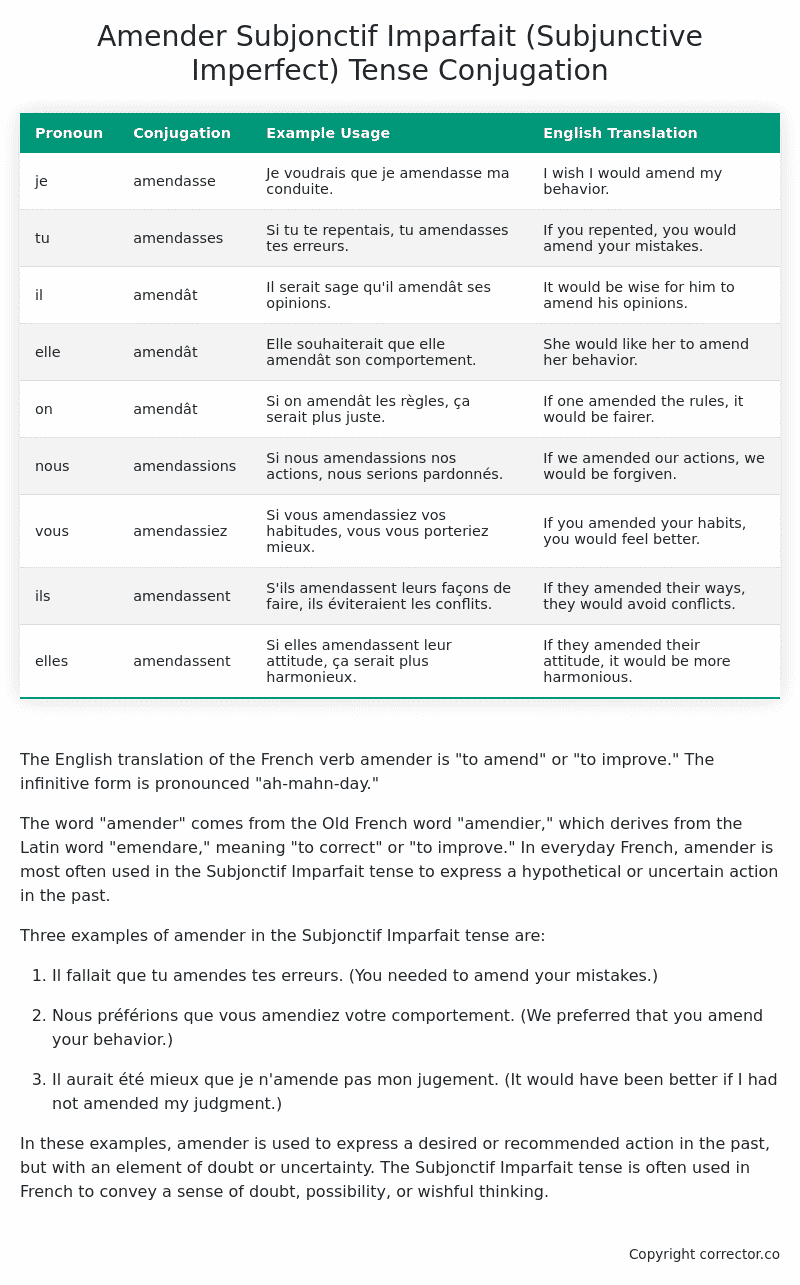Subjonctif Imparfait (Subjunctive Imperfect) Tense Conjugation of the French Verb amender
Introduction to the verb amender
The English translation of the French verb amender is “to amend” or “to improve.” The infinitive form is pronounced “ah-mahn-day.”
The word “amender” comes from the Old French word “amendier,” which derives from the Latin word “emendare,” meaning “to correct” or “to improve.” In everyday French, amender is most often used in the Subjonctif Imparfait tense to express a hypothetical or uncertain action in the past.
Three examples of amender in the Subjonctif Imparfait tense are:
-
Il fallait que tu amendes tes erreurs. (You needed to amend your mistakes.)
-
Nous préférions que vous amendiez votre comportement. (We preferred that you amend your behavior.)
-
Il aurait été mieux que je n’amende pas mon jugement. (It would have been better if I had not amended my judgment.)
In these examples, amender is used to express a desired or recommended action in the past, but with an element of doubt or uncertainty. The Subjonctif Imparfait tense is often used in French to convey a sense of doubt, possibility, or wishful thinking.
Table of the Subjonctif Imparfait (Subjunctive Imperfect) Tense Conjugation of amender
| Pronoun | Conjugation | Example Usage | English Translation |
|---|---|---|---|
| je | amendasse | Je voudrais que je amendasse ma conduite. | I wish I would amend my behavior. |
| tu | amendasses | Si tu te repentais, tu amendasses tes erreurs. | If you repented, you would amend your mistakes. |
| il | amendât | Il serait sage qu’il amendât ses opinions. | It would be wise for him to amend his opinions. |
| elle | amendât | Elle souhaiterait que elle amendât son comportement. | She would like her to amend her behavior. |
| on | amendât | Si on amendât les règles, ça serait plus juste. | If one amended the rules, it would be fairer. |
| nous | amendassions | Si nous amendassions nos actions, nous serions pardonnés. | If we amended our actions, we would be forgiven. |
| vous | amendassiez | Si vous amendassiez vos habitudes, vous vous porteriez mieux. | If you amended your habits, you would feel better. |
| ils | amendassent | S’ils amendassent leurs façons de faire, ils éviteraient les conflits. | If they amended their ways, they would avoid conflicts. |
| elles | amendassent | Si elles amendassent leur attitude, ça serait plus harmonieux. | If they amended their attitude, it would be more harmonious. |
Other Conjugations for Amender.
Le Present (Present Tense) Conjugation of the French Verb amender
Imparfait (Imperfect) Tense Conjugation of the French Verb amender
Passé Simple (Simple Past) Tense Conjugation of the French Verb amender
Passé Composé (Present Perfect) Tense Conjugation of the French Verb amender
Futur Simple (Simple Future) Tense Conjugation of the French Verb amender
Futur Proche (Near Future) Tense Conjugation of the French Verb amender
Plus-que-parfait (Pluperfect) Tense Conjugation of the French Verb amender
Passé Antérieur (Past Anterior) Tense Conjugation of the French Verb amender
Futur Antérieur (Future Anterior) Tense Conjugation of the French Verb amender
Subjonctif Présent (Subjunctive Present) Tense Conjugation of the French Verb amender
Subjonctif Passé (Subjunctive Past) Tense Conjugation of the French Verb amender
Subjonctif Imparfait (Subjunctive Imperfect) Tense Conjugation of the French Verb amender (this article)
Subjonctif Plus-que-parfait (Subjunctive Pluperfect) Tense Conjugation of the French Verb amender
Conditionnel Présent (Conditional Present) Tense Conjugation of the French Verb amender
Conditionnel Passé (Conditional Past) Tense Conjugation of the French Verb amender
L’impératif Présent (Imperative Present) Tense Conjugation of the French Verb amender
L’infinitif Présent (Infinitive Present) Tense Conjugation of the French Verb amender
Struggling with French verbs or the language in general? Why not use our free French Grammar Checker – no registration required!
Get a FREE Download Study Sheet of this Conjugation 🔥
Simply right click the image below, click “save image” and get your free reference for the amender Subjonctif Imparfait tense conjugation!

Amender – About the French Subjonctif Imparfait (Subjunctive Imperfect) Tense
Formation
Common Everyday Usage Patterns
Interactions with Other Tenses
Subjonctif Présent
Indicatif Passé Composé
Conditional
Conditional Perfect
Summary
I hope you enjoyed this article on the verb amender. Still in a learning mood? Check out another TOTALLY random French verb conjugation!


